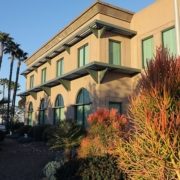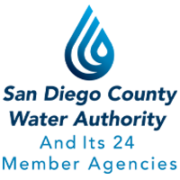Litigation aims to protect ratepayers from ‘LAFCO tax’ while seeking out-of-court settlement
August 21, 2023 – The San Diego County Water Authority today filed suit against the San Diego Local Agency Formation Commission, or LAFCO, to protect the environment and to stop an imminent and illegal rate increase from harming farmers, working families, small businesses, and other water ratepayers across San Diego County.
The lawsuit challenges the decision by San Diego LAFCO to allow two local water agencies to leave the Water Authority without paying their fair share of costs incurred on their behalf over the past few decades. The “detachment” effort is the first of its kind in California, and it would shift approximately $140 million in costs from the Fallbrook and Rainbow water agencies to residents and businesses in the rest of the Water Authority’s service area over the next decade, raising water rates across the county as soon as January 2024.
According to the lawsuit, LAFCO failed to comply with several laws, including the County Water Authority Act, the Metropolitan Water District Act, the Cortese-Knox-Hertzberg Local Government Reorganization Act of 2000, and the California Environmental Quality Act, or CEQA. During the three-year process of detachment – also called “reorganization” – the Water Authority raised numerous substantive concerns about LAFCO’s approach and methods; however, LAFCO disregarded critical problems to reach its pre-determined goal of approving detachment.
“Litigation is a last resort, but LAFCO’s deeply flawed decision leaves us with no choice but to stand up for residents, businesses and the environment,” said Water Authority Board Chair Mel Katz, adding that LAFCO denied a request by the Water Authority to extend a key litigation deadline to accommodate settlement talks. “Even though we were forced to file this lawsuit, we have had several good-faith discussions with Fallbrook and Rainbow, and we look forward to continued talks in hopes of finding a mutually agreeable resolution outside the court process.”
The Water Authority’s lawsuit asserts that LAFCO failed to assess and/or address significant detachment-driven negative impacts to:
- The environment, including the effects of Fallbrook and Rainbow taking more water from the strained Sacramento-San Joaquin Bay-Delta
- Disadvantaged communities that will bear the brunt of cost shift
- Farmers in other parts of the Water Authority service area
- The long-standing efforts by the Water Authority and its 24 members to proactively enhance regional water supply diversification and provide reliable water service countywide even in times of severe drought
“LAFCO should have acted as a backstop to protect the region’s ratepayers from this misguided and outdated attempt by these agencies to secure cheaper water without regard to the loss of reliability to their ratepayers and at the expense of the entirety of the Water Authority, i.e., its other 22 members, its constituents, and the region as a whole,” according to the suit, filed in San Diego County Superior Court.
“Yet, LAFCO’s approach to this seismic shift in regional water supply planning was, at once, both slapdash and pre-determined, with many ‘invented’ processes and little attention paid to staff impartiality, the relevant statutory requirements, the need to disclose and analyze the environmental impacts under CEQA, or Rainbow and Fallbrook’s responsibility for their fair share of existing indebtedness the Water Authority incurred to serve their customers.”
Over the past 30 years, the Water Authority has created one of the most extensive, drought-resilient water supply systems in the nation based on regional demands to ensure water supply reliability for an arid region with few local natural water supplies. The effort worked, providing sufficient supplies across the Water Authority service area during a serious drought in 2020-22. It also came at the cost of a few billion dollars over the past three decades – investments approved by the Water Authority’s Board of Directors over the years with the understanding that each member agency would use and pay for its share of the supplies and facilities over the long-term.
LAFCO’s approval of the Fallbrook and Rainbow detachment applications in July 2023 included an arbitrary exit fee for the two districts. That LAFCO-designed fee fell $140 million short of covering the two agency’s costs over just the first decade of detachment even by LAFCO’s own flawed methodology based on years-old data and questionable projections.
“LAFCO staff reverse-engineered an exit fee that would impose the least possible economic burden on Fallbrook and Rainbow, ignoring the guidance provided by its own expert and relying on stale data and projections, despite the availability of updated revenue figures that could have been used in calculating the fee,” the lawsuit said. “Despite prior Commission discussion and the public discourse about the need for more data and options, LAFCO approved the Resolutions that adopted staff’s arbitrary number for exit fees without any substantial evidence or legal support.”
The detachment approval by LAFCO was also flawed in that it denied voters across the San Diego region the opportunity to vote on the proposal, in violation of state law. The disenfranchisement of more than 3 million residents showed “a clear intent by LAFCO to interfere with the constitutional right of voters to be heard on the imposition of the ‘LAFCO tax’,” according to the suit.
In addition, the Water Authority’s lawsuit argues that detachment creates a major change in water supply sources for Fallbrook and Rainbow that would cause significant adverse impacts on the environmentally degraded Bay-Delta by increasing water demands on that resource. According to the suit, “CEQA requires LAFCO to conduct an adequate environmental review prior to making any formal decision regarding projects subject to the Act. LAFCO failed to do so before approving the Resolutions, in violation of CEQA.”
To read the lawsuit, go to www.sdcwa.org/member-agencies/lafco-reorganization/.




